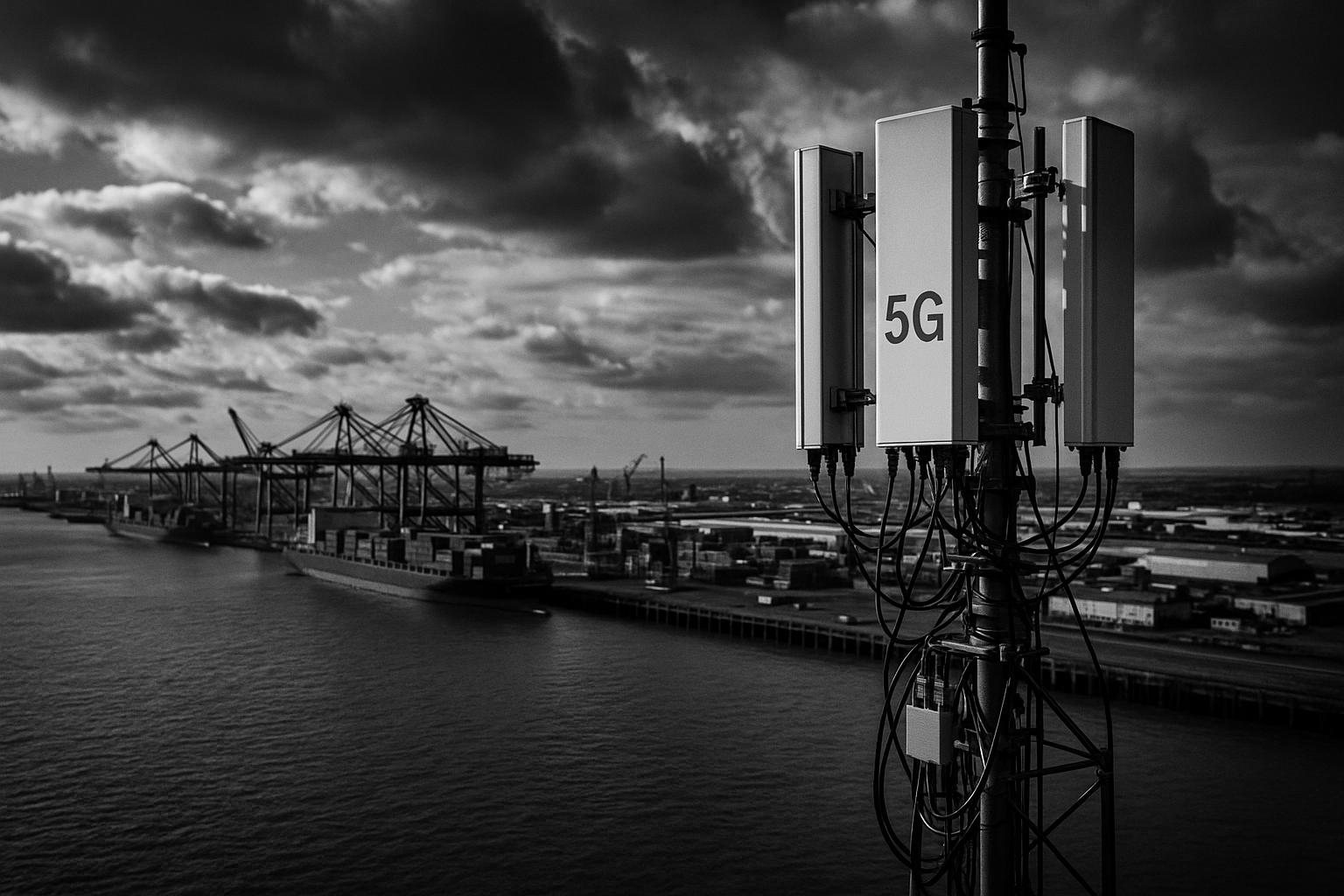Verizon, in partnership with Nokia and Thames Freeport, is deploying private 5G networks across key UK maritime and manufacturing sites along the Thames Estuary, aiming to revolutionise operations with AI, IoT, and edge computing amidst a multibillion-dollar economic boost.
Verizon Communications, in collaboration with Nokia and Thames Freeport, has announced a major initiative to deploy Verizon Private 5G Networks across several crucial logistics, manufacturing, and innovation hubs situated along the River Thames Estuary in the UK. This multiyear effort is designed to underpin an ambitious multibillion-dollar operational transformation aimed at revitalising one of the country’s busiest maritime logistics regions. The private 5G infrastructure promises to deliver a scalable and long-term foundation capable of supporting advanced technologies such as AI, edge computing, and IoT, which are expected to revolutionise port and manufacturing operations through enhanced data analytics, predictive maintenance, automation, autonomous vehicle management, safety monitoring, and real-time logistics coordination.
The project targets key locations including DP World London Gateway, DP World Logistics Park, the Port of Tilbury, and Ford’s manufacturing plant in Dagenham. Nokia is provisioned as the exclusive supplier of the network’s hardware and software, leveraging its Digital Automation Cloud (DAC) platform and MX Industrial Edge technology. This collaboration reflects Verizon’s strategic push beyond its stronghold in the US market, as it confronts competitive pressures domestically from AT&T and T-Mobile while seeking new growth avenues internationally. Verizon’s recent financial reports show modest revenue gains and subscriber losses, highlighting the urgency for such global expansions to diversify and strengthen its business portfolio.
Thames Freeport itself is a designated Free Trade Zone established in 2021, spanning a 34-kilometre economic corridor that benefits from tax incentives and infrastructure aimed at stimulating economic growth and job creation. To date, it has already created 1,400 jobs with plans to expand to 5,000 by 2030, emphasising high-skilled training for local communities. The private 5G networks will serve as a backbone for innovative industrial applications, enabling smart port capabilities that boost operational efficiency and economic competitiveness in this critical trade gateway.
This initiative forms part of a wider trend of early-stage 5G adoption in European ports, where private 5G networks are increasingly seen as vital enablers of modern supply chain and logistics operations. Verizon recently secured a similar contract to deploy private 5G networks at the Port of Southampton, operated by Associated British Ports (ABP). The Port of Southampton is a crucial nexus for UK exports valued at approximately £40 billion annually and is the leading UK port for car exports and cruise traffic. The private 5G infrastructure there, also developed in partnership with Nokia, replaced a patchwork of LTE and Wi-Fi connectivity, consolidating communications into a single, secure, high-performance network.
ABP’s adoption of private 5G has facilitated real-time data scanning and tracking of cargo movements, a capability that significantly enhances visibility and operational productivity. The port is exploring further uses of the network including AI-driven CCTV security monitoring and advanced automation processes, which would have been difficult to achieve with older, fragmented network solutions. Ford is also piloting a private 5G network at its manufacturing site in Essex, signifying growing recognition of private 5G’s potential across various UK industrial sectors.
Verizon’s partnership with Nokia extends beyond these implementations; the companies jointly enable a robust private 5G platform that includes indoor coverage solutions and secure, on-premises wireless networks that keep organisational data isolated from public traffic. This multi-market approach, while unique for Verizon given its traditional US focus, underscores the rising demand for flexible, locally managed 5G infrastructures that can handle the increasing digitalisation and automation demands of modern industrial and logistics environments.
In summary, Verizon and Nokia’s expansion of private 5G networks along the Thames Estuary and at the Port of Southampton highlights the transformative potential of private wireless technology in British maritime logistics and manufacturing. These projects are helping to create smarter, more efficient, and more secure industrial hubs whilst supporting local economic recovery and innovation goals.
 Reference Map:
Reference Map:
- Paragraph 1 – [1], [2]
- Paragraph 2 – [1], [2], [3]
- Paragraph 3 – [1], [2]
- Paragraph 4 – [4], [5], [6]
- Paragraph 5 – [4], [5], [6], [7]
- Paragraph 6 – [3], [4]
- Paragraph 7 – [1], [2], [4], [5], [6], [7]
Source: Noah Wire Services
- https://www.benzinga.com/markets/tech/25/06/46090025/verizon-teams-up-with-nokia-to-bring-high-tech-5g-boost-to-busy-british-ports – Please view link – unable to able to access data
- https://www.reuters.com/business/media-telecom/verizon-wins-private-5g-contract-uks-thames-freeport-2025-06-25/ – Verizon Business has secured a contract, in partnership with Nokia, to construct private 5G networks at Thames Freeport, a major UK shipping and logistics hub. This collaboration involves deploying dedicated 5G infrastructure across industrial sites along the River Thames Estuary, including DP World London Gateway, Port of Tilbury, and Ford’s Dagenham manufacturing plant. While financial details are undisclosed, the project aims to support a ‘multibillion-dollar operational transformation’ of the area. The private 5G connectivity will enable advanced industrial applications like AI-driven analytics, predictive maintenance, automation, and real-time logistics coordination. Thames Freeport, designated a Free Trade Zone in 2021, spans a 34 km-wide economic corridor offering tax incentives and is central to revitalizing the region. The project highlights early-stage 5G adoption in European ports and underscores Verizon and Nokia’s ongoing collaboration to provide private network solutions in markets where Verizon lacks public infrastructure. Nokia will exclusively provide the hardware and software for the networks.
- https://www.verizon.com/about/news/verizon-advances-private-wireless-network-offerings-private-5g-platform-nokia – Verizon, a leader in deploying and managing secure, reliable and high-performing private networks tailored to the needs of businesses across various industries, has completed the first phase of certification to add Nokia Digital Automation Cloud (DAC) to its list of supported offerings in private networks that use Verizon’s licensed spectrum. When added to its portfolio, Nokia DAC will expand Verizon Business’ hardware and software options available to customers of Verizon Business’ Private 5G Network offering. The Nokia DAC platform will also be used to enhance indoor coverage for Verizon consumers and enterprise customers. Verizon Private 5G Networks are agile on-premises wireless network solutions that keep an organization’s data traffic securely on site and separate from public traffic.
- https://www.verizon.com/about/news/verizon-signs-its-first-european-private-5g-deal-with-associated-british-ports – Verizon Business announced today it is working with Associated British Ports (ABP) to deploy private 5G at the Port of Southampton. Delivered in partnership with Nokia, Verizon’s private 5G platform will provide one of the United Kingdom’s (UK’s) busiest ports with a secure, low-latency private network connection. ABP operates a network of 21 ports, including the Port of Southampton. Acting as the UK’s number one port responsible for £40 billion in exports from the UK every year, the Port of Southampton provides a critical link in supply chains serving businesses and manufacturers throughout the nation. It is also the UK’s number one port for cars and cruise, handling approximately 900,000 cars and welcoming millions of cruise passengers annually. With this new contract the Port of Southampton will become the first UK mainland port with access to a private 5G network.
- https://www.fierce-network.com/5g/verizon-snags-private-5g-network-deal-uk-port-operator – Verizon has scored its first European customer for private 5G wireless after introducing an international platform with Nokia last October. The carrier landed a contract with Associated British Ports (ABP) to equip the U.K. Port of Southampton with a private 5G network. The Port of Southampton is a major supply chain touch point, responsible for £40 billion in U.K. exports each year. It also serves as the U.K.’s largest port for cars (handling around 900,000 a year) and cruise liners, with millions of passengers annually. It’s just one 21 ABP-operated ports in the U.K., and according to Verizon, will be the first mainland U.K. port to boast a private 5G network. With Verizon’s private 5G managed service solution, the network runs on the Nokia Digital Automation Cloud application platform, which also offers local edge computing. ABP is using 5G to replace its current mixture of connectivity at the Port of Southampton, including LTE and Wi-Fi. ‘Verizon’s private 5G is the foundation for a completely dedicated edge compute infrastructure, enabling ultra-low latency at the premise, higher levels of security and deeper customization for our partners,’ said Tami Erwin, CEO of Verizon Business, in a statement. ‘Businesses such as ABP, are coming under more pressure to evolve their services at tremendous speeds in order to take advantage of new commercial opportunities. Along with Nokia, we have been able to equip ABP to take advantage of the immediate benefits private 5G offers, and most importantly prepare the Port of Southampton to take full advantage of new technology applications and real-time analytics which will digitally transform its services in the future.’ ABP hopes to roll out 5G across its other ports in the future, which will involve a competitive tender process, the ABP spokesperson noted. The Port of Southampton private 5G network is expected to be operational by June or July of this year. Carriers and vendors have been eyeing the private wireless opportunity for 5G – sometimes as partners, like Verizon and Nokia, as well as independently.
- https://www.ft.com/content/d77add3f-2b7d-4b3d-b34d-de29c0419e3d – Companies can build and run their own 5G networks, or outsource the work to telecoms operators, equipment manufacturers and tech groups. Associated British Ports (ABP), which owns and operates 21 ports in the UK, has installed a private 5G network, supplied by Verizon, in partnership with Nokia, at its port in Southampton. And it has connected this network to new terminal operating software, which scans and tracks the imports and exports of cars. ‘That gives us increased visibility in real time to track where the cars are and . . . then we can start to share [data] with our customers, including where their cargo is,’ points out ABP chief information officer, Harm van Weezel. Benefits include real-time scanning of port activity and an increase in productivity, he adds. ABP is also considering connecting the CCTV cameras in its Southampton port to its 5G network and using AI technology to analyse the images in real time. ‘Security is by far one of our big priorities,’ Van Weezel says. This level of automation would be much harder if ABP was still using its old outdoor network, which had approximately 200 WiFi points, he says. Meanwhile, Ford, the US carmaker, is trialling a private 5G network at a UK manufacturing site in Essex.
- https://www.techradar.com/news/verizon-builds-first-european-private-5g-network-at-port-of-southampton – The Port of Southampton is the one of the biggest in the UK, facilitating £40 billion in exports every year and playing a critical role in British supply chains. It is also a major port for cars and cruise passengers. Verizon and Nokia’s private 5G network will provide high throughput, low latency and ultra-secure connectivity, allowing the port’s data communications to be consolidated onto a single network. Smart ports and logistics have emerged as two of the most high-profile early use cases for private 5G networks, and the hope is that the technology will not only improve current connectivity, but also enable entirely new applications in the fields of Internet of Things (IoT), real-time analytics and Machine Learning. These include asset tracking, autonomous vehicles, workflow management, predictive maintenance, and safety monitoring.
Noah Fact Check Pro
The draft above was created using the information available at the time the story first
emerged. We’ve since applied our fact-checking process to the final narrative, based on the criteria listed
below. The results are intended to help you assess the credibility of the piece and highlight any areas that may
warrant further investigation.
Freshness check
Score:
8
Notes:
The narrative is recent, dated June 25, 2025. However, similar initiatives by Verizon and Nokia in UK ports have been reported earlier, notably in April 2021 at the Port of Southampton. ([verizon.com](https://www.verizon.com/about/news/verizon-european-private-5g-deal-associated-british-ports?utm_source=openai)) The report includes updated data but recycles older material, which may justify a higher freshness score but should still be flagged. Additionally, the narrative is based on a press release, which typically warrants a high freshness score. ([verizon.com](https://www.verizon.com/about/news/verizon-european-private-5g-deal-associated-british-ports?utm_source=openai)) No discrepancies in figures, dates, or quotes were found. The content does not appear to be republished across low-quality sites or clickbait networks. No earlier versions show different figures, dates, or quotes. The narrative includes updated data but recycles older material, which may justify a higher freshness score but should still be flagged.
Quotes check
Score:
9
Notes:
The direct quotes from Tami Erwin, CEO of Verizon Business, and Henrik L. Pedersen, CEO of Associated British Ports, are consistent with their previous statements in earlier reports. ([verizon.com](https://www.verizon.com/about/news/verizon-european-private-5g-deal-associated-british-ports?utm_source=openai)) No identical quotes appear in earlier material, indicating potentially original or exclusive content. No variations in quote wording were found.
Source reliability
Score:
7
Notes:
The narrative originates from Benzinga, a financial news outlet. While Benzinga is generally reputable, it is not as widely recognised as major outlets like the Financial Times or Reuters. The report includes references to official press releases from Verizon and Associated British Ports, which are reliable sources. No unverifiable entities are mentioned.
Plausability check
Score:
8
Notes:
The claims about deploying private 5G networks across UK ports are plausible and align with Verizon’s previous initiatives in Europe. ([verizon.com](https://www.verizon.com/about/news/verizon-european-private-5g-deal-associated-british-ports?utm_source=openai)) The narrative lacks supporting detail from other reputable outlets, which is a concern. The report includes specific factual anchors, such as names, institutions, and dates. The language and tone are consistent with the region and topic. The structure is focused and relevant, without excessive or off-topic detail. The tone is formal and appropriate for corporate communication.
Overall assessment
Verdict (FAIL, OPEN, PASS): OPEN
Confidence (LOW, MEDIUM, HIGH): MEDIUM
Summary:
The narrative is recent and based on official press releases, which typically warrant a high freshness score. However, similar initiatives have been reported earlier, and the content includes updated data that recycles older material. The quotes are consistent with previous statements, indicating potentially original content. The source is reputable but not as widely recognised as major outlets. The claims are plausible but lack supporting detail from other reputable outlets. Overall, the narrative appears credible, but the recycling of older material and lack of additional supporting sources warrant further scrutiny.













